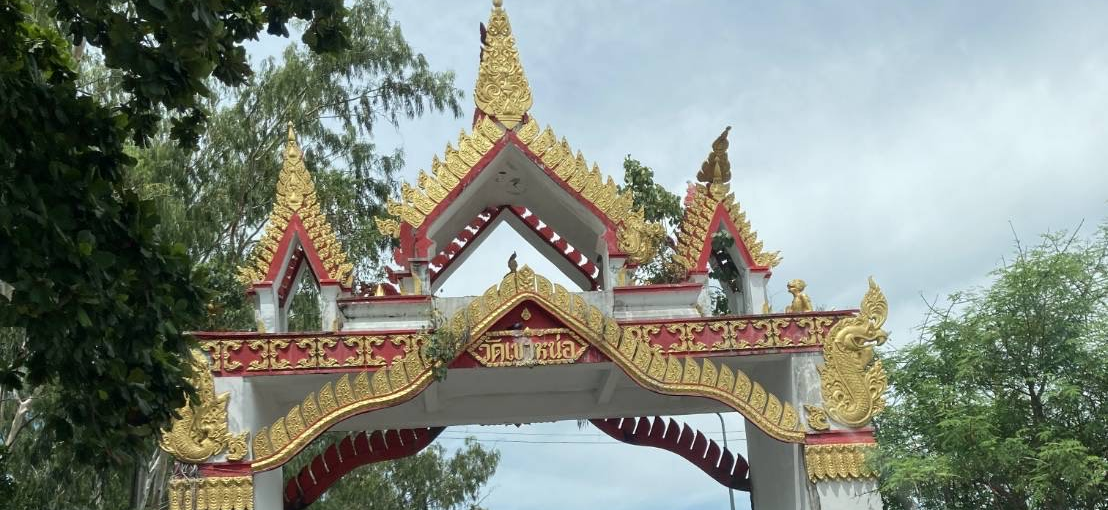By Arabella, ESL Kindergarten Teacher in Tak
After three months of living in the Land of Smiles, I have experienced and learned many new things in and out of work. Some of them I wish perhaps I had known before moving to the kingdom of Thailand. So, here are 8 MORE things I wish I had known before moving to Thailand…
- Playing Cards in Public is Illegal
This surprise came during our group cultural training in Sukhothai when our trainer told us that playing cards in public (particularly 120 playing cards) was considered a form of gambling which is strictly prohibited. This surprised us, since upon arriving in Bangkok we played a game of Uno in the lobby of our hotel and no one mentioned it. We were very lucky, since this could have resulted in a hefty fine.
Despite this, the lottery is super popular and you will find many sellers on the street, in shops and large establishments with “suitcases” of lottery tickets which you can usually buy for around 100 Baht (or £2.30). Thai people can be very superstitious and the lottery is extremely popular, with people using ‘lucky numbers’ (such as the birth dates of the royal family). Even being drafted into the Thai military service is determined by a ‘lucky draw’ (red you are in, black you are out), so it was a big surprise that playing cards in public were considered to be illegal.
- Each Thai Province has its Own Flag
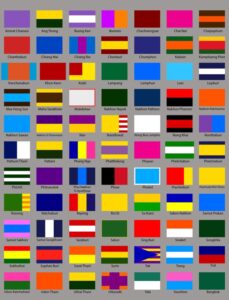
This was a unique surprise I learned on my way to Kamphaeng Phet, when arriving at the city border I saw a flag unlike the national Thai one. This one was yellow, red and green with a symbol at the centre. Upon researching what this was, I learned that every province in Thailand has its own flag, (including the province of Tak, where I live). Each flag is different and inherently unique, which further encourages the support of the community, province and country of the Thai people.
However, this was not the only place I noticed a new flag. Outside many Buddhist temples (or ‘wat’ in Thai), there was the Thai flag but also a beautiful golden flag with a circle symbol in its centre. After attending a Buddhist camp with the kindergarten cohort at my school, I learned that this flag was the “tong dhammachak” (Thai Buddhist flag). The yellow/orange colour is representative of the clothes that Thai monks wear and the circle (or ‘wheel of law’) in the centre represents the teachings of the Buddha.
- Change of Cutlery!
One thing that surprised me when eating was that the cutlery used in Thailand for every meal is different to that of Western cultures. Typically, we would imagine using a knife, fork and maybe a spoon for our meals – however, knives as cutlery do not exist in Thailand! Thai people only use a fork (som) and a spoon (chon) for their meals and would only use a knife if it was a big cutting knife when preparing the food. As peculiar as this sounds, using only a fork and spoon makes a lot of sense when eating Thai cuisine, since a lot of dishes consist of rice and a pre-cut meat or vegetable side dish. Therefore, knives are generally not really needed – and many use the side of the spoon to cut things smaller anyway. Even in our ‘starter kit’ given to us at the training, this only contained a fork, spoon and some chopsticks!
- The Difference in Available Beauty Treatments
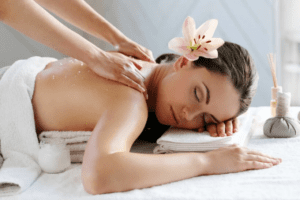 When receiving our first paycheck, my international colleagues and I wanted to have a spa day where we paid for a few beauty treatments. For me, since my eyelashes and brows are quite fair, I was hoping to get them tinted (a treatment I got regularly back in England). However, after asking around, we soon realised that many treatments that we wanted were not available in our city. Beauty treatments like tinting and waxing were not common beauty treatments in Thailand, and we struggled to find any salon in our city that did these. Body hair is more socially acceptable here, and Thai people already have dark features so have no need for tinting. Treatments in Thailand are generally more centred around nails/toenails or massages.
When receiving our first paycheck, my international colleagues and I wanted to have a spa day where we paid for a few beauty treatments. For me, since my eyelashes and brows are quite fair, I was hoping to get them tinted (a treatment I got regularly back in England). However, after asking around, we soon realised that many treatments that we wanted were not available in our city. Beauty treatments like tinting and waxing were not common beauty treatments in Thailand, and we struggled to find any salon in our city that did these. Body hair is more socially acceptable here, and Thai people already have dark features so have no need for tinting. Treatments in Thailand are generally more centred around nails/toenails or massages.
This was disappointing and we were recommended to buy the beauty products like wax strips and eyebrow/lash tint) online (through common online shopping applications like “Lazada” or “Shopee”) and attempt to do the beauty treatments on ourselves! In bigger cities like Chiang Mai and Bangkok, it was more common to find salons catering to more ‘Western beauty ideals’ like waxing – we were told many waxing salons only have foreign (or “falang”) customers. However, I have yet to find a salon in any city that does beauty treatment tinting!
- Purchasing Alcohol
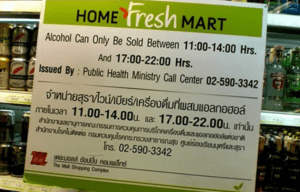
Something that my friends and I learned the hard way was that in Thailand, you legally cannot buy any form of alcohol during designated times of the day. This is true for the shops, supermarkets, etc. and is especially true in smaller cities like my own. This can be frustrating when trying to prepare for a nice housewarming and wanting to buy some booze in advance, but the laws behind this are meant to discourage daytime drinking and deter buying alcohol during hours that are deemed “inappropriate”. It also works under the idea that citizens might be drinking at work, so the times were put in place to help avoid this. However, the laws are different for drinking in bars and restaurants, where this is still permitted.
- Super Early Lunchtimes
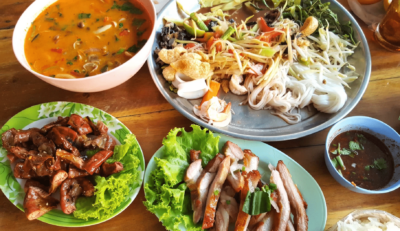 Every day at school, we are allowed a one-hour break for lunchtime. In England, this might be around 12 or 1pm, but in Thailand the lunchtimes start at 11.30am! In the kindergarten, after helping set up the lunch for the children we have a lunchtime break from 11.30am until 12.30pm. This early lunchtime took a bit of getting used to since normally I eat my breakfast around 9am or 10am in the morning – acclimatising to this meant that I needed to start my mornings off by eating early so I could be hungry enough by the time that lunchtime rolls around!
Every day at school, we are allowed a one-hour break for lunchtime. In England, this might be around 12 or 1pm, but in Thailand the lunchtimes start at 11.30am! In the kindergarten, after helping set up the lunch for the children we have a lunchtime break from 11.30am until 12.30pm. This early lunchtime took a bit of getting used to since normally I eat my breakfast around 9am or 10am in the morning – acclimatising to this meant that I needed to start my mornings off by eating early so I could be hungry enough by the time that lunchtime rolls around!
Another surprise regarding food was that in Thailand, there is no difference in the type of food for the time of day, like we have in Western culture. For example, in England we have foods that we might consider to be “breakfast foods” (eggs and bacon on toast), “lunch foods” (a sandwich with fruit and crisps) and “dinner foods” (a cooked meal, like curry). However, in Thailand, most of the meals consist of rice or noodles and also have a hot and/or spicy side dish involving meat or vegetables (or both!) – all food is delicious but a vast change from the usual “food categories” we are used to in the West.
- The Feet are Considered the Lowest Part of the Body
I remember before coming to Thailand learning something about showing someone the bottom of your foot is considered the same as showing your middle finger. Many Thai friends I have spoken to do not understand the meaning of “flipping someone off”, but they would never touch someone or their belongings with their foot. This is because, in Thailand, the head is the highest part of the body and is considered the purest – whereas the feet are considered the lowest and thus the dirtiest. It is considered very rude to use your feet for anything, including pointing at something, nudging something with them, showing the bottom of them to someone older than you, or even holding open a door with your foot.
This is integrated into many parts of Thai culture – it is common practice to take off your shoes before entering any establishment such as a shop or another person’s house (as a sign of respect because the shoes have been in contact with the dirty ground); in temples, you must point your feet away from the Buddha (by either kneeling or crossing your legs); and stepping on money (even by accident) is considered a serious crime (due to it being considered extremely disrespectful to the King, whose face is on the bank notes). I made the mistake of moving a book with my foot and was educated on why this was wrong by my co-teacher – and I have been very cautious regarding my feet since!
- Using Numbers to Laugh!
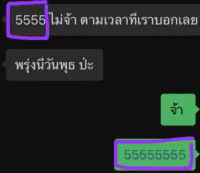
Lastly, one fun thing I learned whilst living in the Land of Smiles was that instead of saying “hahahah”, ‘lmao” or “lol” when finding funny in an online message, Thai people will instead put “55555” when they are laughing. I learned the reason for this when educating myself on Thai numbers – “55555” is used in text messages because the word for the number “five” in Thai is pronounced as “ha”. Hence why “55555” is used, where more 5’s mean something is very funny – “5555555555555”!
Ready to start your teaching adventure in Thailand? Explore our program page or submit an application

